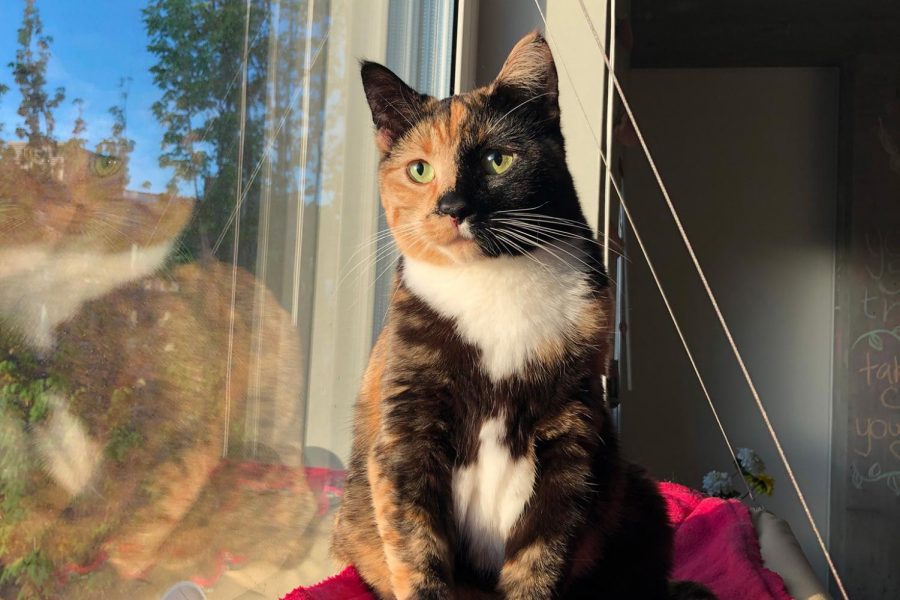E-Meow-Tional Support Animal
Elinor Dashwood, feline resident of Vi Hilbert, basks in the sun and takes in the view.
Emotional support animals, or ESAs, are pets that help alleviate negative symptoms by reducing or calming a person’s physiological or emotional disability. ESAs are not categorized as service animals since they require little to no training. On campus, to obtain and register an ESA with Disability Services, you must get a prescription from your licensed mental health professional, either a therapist or psychiatrist and a letter proving the animal is a part of an individual’s treatment.
Cats have existed for as long as human civilization has existed, from controlling rodents and agricultural pests 100,000 years ago in ancient Mesopotamia to cat domestication and devotion in Ancient Egypt 4,000 years ago.
Present-day, cats have evolved into the perfect companion. Their personalities classify them as an ideal emotional support animal.
Alison Kaitcer, a senior studying creative writing at Seattle University, lives on campus with her emotional support cat, Ellie.
“I have an anxiety disorder, depression and a litany of other things. I grew up with a lot of animals and once I came to college, I had no animals. I immediately was like, ‘Oh no, this is not going to go well,’” Kaitcer said.
Pharmaceutical medication is always an option, but animals are a nice, natural way of medication and therapy, especially if you’re already used to taking care of one.
“It took me a while to realize this was something I need. There’s a lot of people that have them that might not necessarily need them, so I felt weird about it,” Kaitcer said. “After talking to my therapist about for a year, they wrote me a prescription for my cat.”
A cat on campus is not an option for many students, but fortunately the popularity of cat cafe’s leaves space for cat companionship and caffeine. Caitlin Unsell, one of the owners of Capitol Hill’s Neko Cat Café, took notice of all the positive properties within cats before opening the café.
“I used to live in Japan, in Sapporo, and while I was living there, I had left my cat back home with a friend so I was of course missing my cat,” Unsell said. “I started going to cat cafés when I had time off, and I just fell in love with them.”
It wasn’t just living in Japan that caught her eye, but how interactions with cats could be both an enjoyable and calming experience.
“Every cat can heal someone on some level, they naturally can lower people’s heart rates and reduce stress just by being in their presence and petting them,” Unsell said. “So, it’s just a relaxing, soothing and therapeutic experience.” According to Kaitcer, emotional support animals can do more than relax and soothe their owners, but can improve their everyday life in other ways.
“Having Ellie around has helped me so much,” Kaitcer said. “My grades and even my general outlook has improved.”
“Having an animal can’t be bad, but if you’re being obnoxious about it like bringing your dog that isn’t a service dog that’s not trained into a store you could potentially be putting other people at risk,” Kaitcer said. “It’s a multi-faceted issue.”
So, would an emotional support animal be beneficial to everyone?
“If you feel like it’s something that you want, it’s worth looking into,” Kaitcer said. “I don’t know if I would recommend it to everyone like it’s going to fix all of your problems because you also have to scoop a little box every day.”
London may be reached at [email protected]










